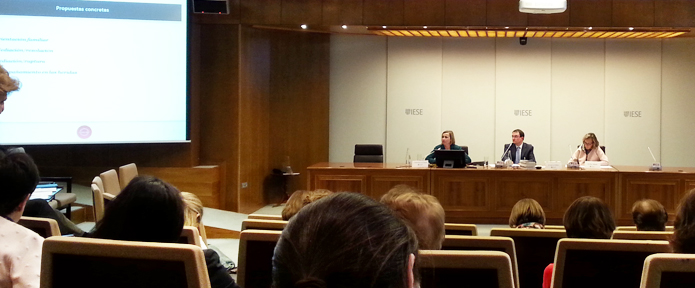Pope Francis's teachings and applications to the Education
IX ISCR Theological-Didactic workshop

The ISCR of the University of Navarra held its IX Theological-Didactic workshop on March 7. quotation A hundred pedagogical professionals, religion teachers and catechists from different cities gathered at IESE in Madrid to study in depth the "Teachings of Pope Francis and applications to Education".
The first discussion paper ran to position of Gregorio Guitián, professor of Moral Theology at the School of Theology of the University of Navarra, who spoke of the magisterium of Francis in the Economics in the light of the documents Evangelii Gaudium y Laudato si'.
Evangelii Gaudium has a pastoral intention, which corresponds to a linguistic style characterized by vigorous and expressive phrases: "No to a Economics that kills. No to the new idolatry of money. We cannot trust in the blind hand of the market". Although the Pope has been accused of dealing with technical aspects that have nothing to do with the Magisterium, "there is nothing in the exhortation that is not found in the social doctrine of the Church", affirmed Professor Guitián.
Francis has made a positive evaluation of the free market, which only responds to some needs that can be solved with purchasing power, and there are many others that have no outlet in the market: "I can buy a house, but not a home; I cannot buy love; the market does not respond to the needs of spiritual subject ," said Professor Guitián. Evangelii Gaudium deals with two major problems related to Economics: social exclusion and consumerism.
In Laudato si' Francis warns of the risk of exclusion that many people suffer. He calls for action, for change. Man cannot do what he wants with nature; nature belongs to God and man is its steward. This is how to understand the points of Laudato si' that speak about Economics. "For the ordinary citizen, chapters 2 and 6, which are a call to ecological conversion, must be taken into account," stated Professor Guitián. "One cannot be a good Christian if one neglects the care of nature. Anti-ecological behaviors are immoral actions. The Pope makes reference letter to Christians who mock the care of nature and perhaps that aspect is not sufficiently taught in homilies, in the catechesis, in the religious teaching . Let's not get bogged down in economic discussions. The Pope calls for a change; he appeals to the public authorities and it is convenient to initiate processes beyond the short deadline", concluded Guitián.
This was followed by roundtable with the participation of Beatriz Ozores, a graduate in Religious Sciences from the University of Navarra, who spoke about the relationship between pedagogy and mercy "there is no true Christian pedagogy without mercy. Educating in mercy is not just another option but a commitment". For that it is necessary to exercise listening. "Pope Francis invites us to rediscover the works of mercy, which we must live ad intram, among ourselves and therefore in the school". Also present at the table was Ramiro Pellitero, professor at the School of Theology at the University of Navarra, who encouraged those present to evangelize, which is nothing other than "communicating, announcing mercy." He stressed the importance of the educator to put in internship what he teaches, so that he becomes, in the words of Pope Francis "an awakener of the report of God"; not to be afraid of the existential peripheries and to convert the heart to solidarity, to overcome, thus, the globalization of indifference.
In the afternoon, Fina Trèmols, manager of the communication of the Ecclesiastical Schools spoke about how Francis has managed to change the perception of the image of the Church in the media through gestures during these three years of his pontificate. For her part, Maria Alvarez de las Asturias, director of the family-oriented high school "Coincidir" and defender of the bond in the Archdiocese of Madrid, recommended reading the homily that Francis delivered in Guayaquil (Ecuador) last July. In it, according to the expert, his pontificate is condensed in relation to marriage and the family. She exposed practical orientations to carry out in the field of Education: to attend to families in weakness, not to label people, to know how to distinguish a difficulty from a problem, as well as the need of the training in topics related to the family in order "not to water down the message of marriage", since "getting married supposes an anthropological change for people".
The workshop ended with an interesting and enriching colloquium between the four round table speakers and the audience.




